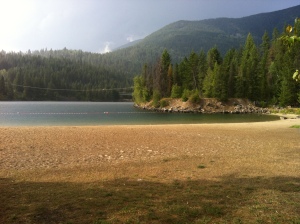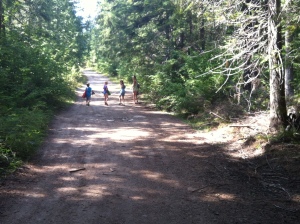Summer is a good time to go on vacation. Winter means spending more money and time to get to a tropical clime. It’s easier to pack, dress, travel, eat, and be outdoors when the weather is warmer. And people look better in the summer.
I’ve read a few recent blog posts recapping summer vacays. I like this: I get to know a little bit more about the person as well as cherry-pick their good ideas about what worked for them.
Following suit, I have tried twice to recap what we did on our holidays. The first time my husband said it sounded like a book report I was writing for school. I could have provided an index for it. Did I really enjoy my holidays so much that it came out sounded formulaic? I realized that it wasn’t so much what we did that I found interesting, but more what I learned this year about vacations.
Our vacation this year involved kids (our own), and travel (driving 5+ hours in a spell), and family. We often do the same thing for summer vacation: visit my parents and my husband’s parents. Both grandparents get to see grandkids. We get somewhat of a break. It is not our usual routine. We are not at work.
But there needs to be balance. Here’s what I’ve learned thus far:
In the process of having adventures to look back on, no one should be suffering in the making of these memories (namely me). If someone doesn’t want to do something, weigh this into the overall appeal of the factor. My parents generally forced me to go camping when I was a kid thinking it was good for me. To this day I suck on this resentment and still don’t like camping.
My husband and I are always falsely optimistic that going on vacation means a break from our kids. We do go see grandparents who do a lot with them but everyone gets tired. We do get a break, but we still need to manage, intervene, monitor, cajole, and maintain some semblance of routine and sanity. As the kids have gotten older I’ve found that physically removing myself from the situation makes it easier for me. Each to their own! Now my husband and I book ourselves into a hotel for a few nights and let the grandparents (and kids) have their fill.
People are funny about their homes and their stuff. No matter where you go -or how happy your guests/family are to see you- both parties need to remember you don’t think or act the same way about everything. It’s not ‘understood.’ Showers, meals, quiet times, TV shows, and where to go eat are all up for debate even when you’ve been raised by these people. People also may have expectations that you will just “fit into” what they generally do and everyone will get along doing the same thing. I say let your guests take the lead on most things: do what they do even if it makes no sense. They may also adapt to you as well. When you start to find that these accommodations and alterations are seemingly more work than staying at home (usually day 3-5), it may be time to move on.
It’s a different road when you travel with kids. You can’t explain everything to a small person’s satisfaction even if you use logic. Especially if you use logic. The kids don’t understand what 4 -5 hours or 600 km really means. No, the road isn’t straight the whole way and you can’t watch a movie on a windy road. No, I don’t think you can try it for a little while.
At a certain age, everyone packs their own stuff. Car travel means you can bring so much (unnecessary) stuff! I gave the kids lists, but had them pack their own suitcases. I purposely did not bring a watch. I packed an extra bag of only fitness wear for MY vacation.
The sign of a good vacation is a change in routine. A good vacation means you get to do what you want, and you get home feeling lighter and energized. Who am I kidding when I say this? No one gets home from vacation feeling the overwhelming need to get back to work and feeling super rested. But I had stayed up late and slept in. I ran and exercised when I felt like it. I drank coffee in the middle of the day. I watched a movie one day when I first woke up. This was not even remotely close to usual for me.
Albeit not work and a chance to live a little more slowly, a vacation is a thin veil hiding behind sunscreen when we take leave of our senses.
Do we really assume it can go on forever?




